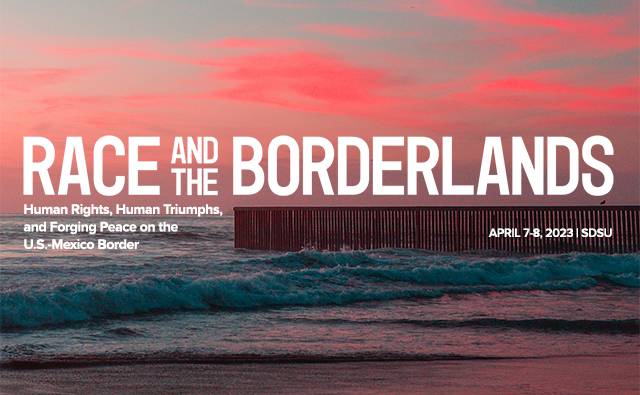Conference on Human Rights and Racialization at the Border Begins April 7 at SDSU

The two-day conference creates space for open dialogue on issues affecting the country today
San Diego is a border city nestled up against Tijuana. The two cities make up the western divide between the U.S. and Mexico. This border is what the organizers of the upcoming conference Race and the Borderlands: Human Rights, Human Triumphs, and Forging Peace on the U.S.-Mexico Border refer to as “a site of human suffering and a showcase of human resilience.”
The conference aims to bring together scholars, practitioners, student organizations, and grassroots movements from the San Diego and Tijuana regions to collectively consider issues of human rights and racialization in our borderlands.
The conference is free and open to the public and takes place from 8 a.m. to 6:30 p.m., April 7-8 in the Conrad Prebys Student Union on Friday and in Arts and Letters (AL-101) on Saturday.
Race and the Borderlands is presented by the Fred J. Hansen Peace Chair and the Center for Human Rights at San Diego State University, along with support from The Peacemakers Fund at the San Diego Foundation, the SDSU CAL Bruce E. Porteous Professor in Political Science, and the Center for Latin American Studies.
One of the conference coordinators, Rebecca Bartel, Hansen Peace Chair and associate professor in the Department for the Study of Religion, encourages students to attend. “We need to understand the border as more than only a site of entrapment and violence – which it certainly is – but also understand borderlands as sites of potential and aspiration - and even peace-building,” she said. “The borderlands are multifaceted and pluri-versal; they are hubs of encounter and exchange as well as sites of militarization and criminalization of racialized bodies.”
Featured keynote speakers are Roberto D. Hernández and Nandita Sharma. Hernández is an associate professor of Chicana and Chicano Studies at SDSU and an actively engaged, community-based researcher, scholar, teacher and writer. Sharma is an activist and scholar, whose research is informed by the movements she is a part of, in particular No Borders movements and those struggling for a planetary commons. She is a professor of sociology at the University of Hawaii at Mānoa. Her keynote speech is titled: “Postcolonial Racism: National Sovereignty and the Institutionalization of Separation.”
28 speakers from universities and organizations across the border and the nation are scheduled to participate on panels such as: “Aid as Disruptive Resistance in the Borderlands” and “Racialized Bodies, Criminalized Movements.”
Grace Cheng, director of the Center for Human Rights and co-coordinator of the conference, said, “This conference will bring these issues to light from the various perspectives brought by the presenters, who are involved in research, community work, legal advocacy, healthcare, humanitarian assistance, and art. We envision the conference as providing a space that will inspire collaborations.”
Hernández answered a few questions surrounding the upcoming conference and border justice.
Why do you think it is important to have a conference on Race and the Borderlands?
Conversations about the borderlands are often marked by the categories of the migrant, citizen, refugee, and asylum seeker. While these are all important concepts, they also do much to center the border and nation-states, yet at the same time conceal more than they reveal about the simultaneously racial structuring of the relationship of states to individual nonstate actors. Given the continuing significance of race in our national and global order, we must consider race in conversation with dialogues about borders and human rights.
What are some key insights you hope to teach us in your keynote address?
In my talk, I hope to bring light to some of the racial dynamics that underpin border relations even when not explicitly conceived as such. By exploring how the discourse of immigration and legality or illegality dominates our thinking about borders, I will instead highlight the continued workings of race in immigration, refugee and asylum processes. My aim is to foreground the need for a 21st century conversation about race and human rights at our nation’s edges.
What should we be paying more attention to in our conversations and activism around border justice?
One focal point I hope to draw attention to is a serious reflection on the question of jurisdiction and who or what national or extraterritorial bodies we must look to if we are to achieve justice. Much of how we frame the “problem” comes to dictate the range of possible solutions or remedies to which we can appeal. As such, we are in need of a radical reframing and restructuring of our diagnosis of ‘border issues’ if we are to advance a proper human rights agenda worth the name.
For more information on the conference, visit the Race and the Borderlands website.
